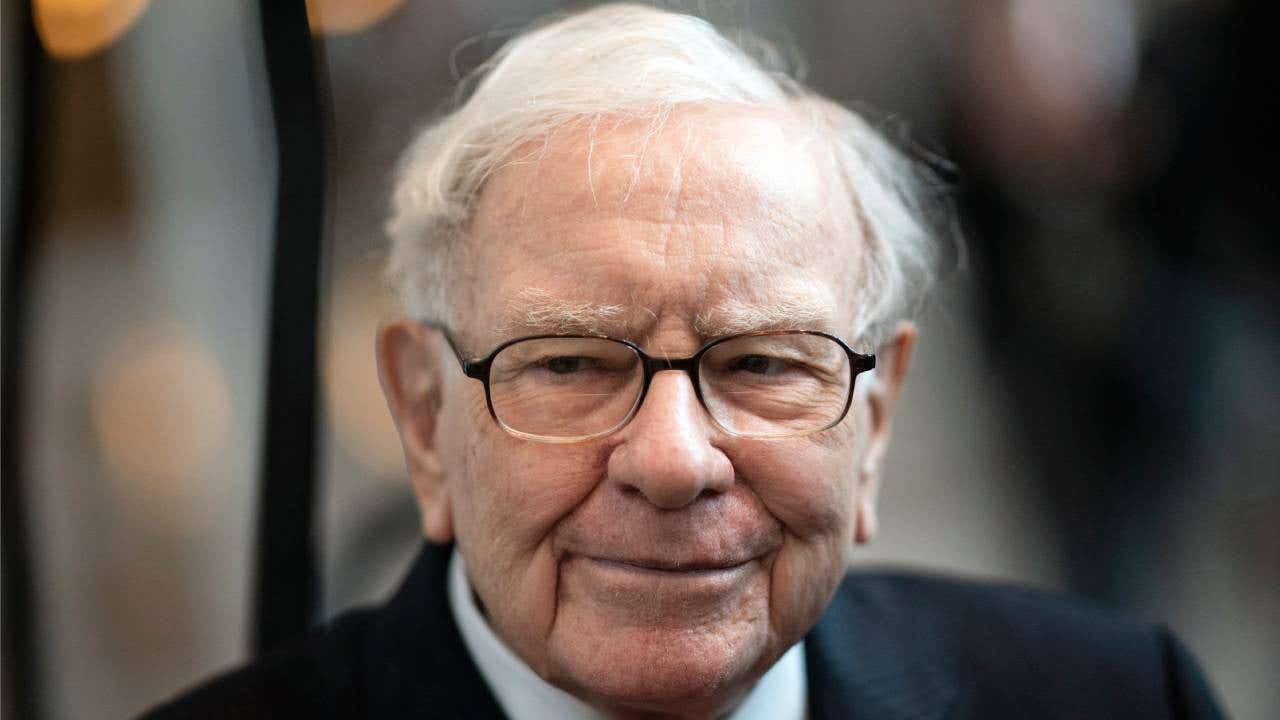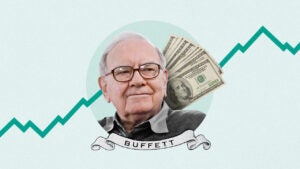Warren Buffett’s investment advice: Top 10 tips for investing success

Warren Buffett is known as one of the best investors of all time, and he’s amassed more than a hundred-billion-dollar fortune through his company Berkshire Hathaway. But he’s not only a great investor, he’s also a great wit, and Buffett enjoys sharing his folksy wisdom with fellow investors.
His advice runs the gamut of topics, not only about investing but about life in general. But today let’s stick to Buffett’s advice that could help make you rich. Here’s the surprising thing — Buffett’s wisdom seems so common sense and practical, and yet it can lead to great wealth.
Top 10 investing tips from Warren Buffett
Below are ten of Buffett’s more widely known aphorisms and what they mean for investors.
1. “Rule No. 1 is never lose money. Rule No. 2 is never forget Rule No. 1.”
Buffett’s point sounds simple here, but it’s disarmingly complex. Of course, as an investor you’re trying to profit in the market, but one of the best ways to do that is by avoiding loss. When you eliminate decisions that expose your portfolio to loss, what’s left is more likely to be a gain. When you have more money in your portfolio, you can compound your gains even faster.
This approach has implications for how you invest. Buffett’s quote suggests that instead of looking for the highest upside, you should be looking to avoid loss first and only then look at gains. That’s a different mindset from investors who view the stock market as a slot machine.
2. “It’s far better to buy a wonderful company at a fair price than a fair company at a wonderful price.”
While some value investors focus on buying only the cheapest companies, Buffett suggests a better course of action is to buy “wonderful” companies — those with better economics and competitive positions. Part of the difficulty here is that whereas fair companies may go on sale relatively frequently, the great companies rarely look cheap.
But a company with a good competitive advantage will likely continue to make money over time, and it can bail you out if you purchase at a too-high price. That may not be the case for a fair company, which may falter and never return to your purchase price or beyond it.
Some of the high-quality companies Buffett has invested heavily in over the years include:
- Apple (AAPL)
- American Express (AXP)
- Coca-Cola (KO)
- Moody’s Corp. (MCO)
- See’s Candy Shops
Apple was the largest position in Berkshire Hathaway’s stock portfolio at the end of 2024.
3. “Opportunities come infrequently. When it rains gold, put out the bucket, not the thimble.”
Here Buffett suggests that when you see an opportunity you need to act quickly and decisively. When the odds are stacked in your favor — such as when stock prices are down significantly — you need to invest heavily, because good prices might not come along again soon.
Buffett often takes this approach when markets are down significantly. He amasses a ton of cash during the good times, and then invests aggressively when stocks plunge. Having a lot of safe cash on hand allows him to use this strategy.
Need an advisor?
4. “We simply attempt to be fearful when others are greedy and to be greedy only when others are fearful.”
While some investors think investing is a lot about the numbers, Buffett suggests that investing has much to do with the behavior of investors themselves. When investors are greedy and push the prices of stocks to the sky, Buffett becomes fearful, because a market plunge may soon follow.
In contrast, when investors run away from the market or a specific stock, Buffett becomes more interested because prices are cheaper. When stocks are cheaper, they don’t have the same risk as when they’re expensive. And this is how Buffett thinks about avoiding losses.
In early 2020, the market plunged as worries about COVID-19 rattled investors. However, some investors dove into the market amid the fear, and the market rallied furiously off its lows.
5. “The most important quality for an investor is temperament, not intellect. You need a temperament that neither derives great pleasure from being with the crowd or against the crowd.”
Here again Buffett touches on the value of temperament for a successful investor rather than intelligence. Rather than trying to go with or against the crowd, investors should analyze what’s going on in the actual businesses, regardless of who likes what stock. By focusing on the objective facts, investors can make decisions that are relatively free of emotion and make better choices.
6. “The stock market is a no-called-strike game. You don’t have to swing at everything — you can wait for your pitch.”
This quote is one of Buffett’s most famous, and it offers the essence of picking your opportunity. You needn’t invest until you find an opportunity that you find attractive, one that meets your standards of potential reward for the risk you’re taking.
Again, Buffett counsels investors to wait until they find an opportunity that is unlikely to lose them money. You don’t have to take any chance on a stock that you don’t find attractive or a business you don’t understand.
7. “If you like spending six to eight hours per week working on investments, do it. If you don’t, then dollar-cost average into index funds.”
Buffett has long advised most investors to use index funds to invest in the market, rather than trying to pick individual stocks. By picking individual stocks, you’re working against the pros who have extensive intelligence on companies. In contrast, if you buy an index fund based on the Standard & Poor’s 500 index, you’ll own the market, the target that everyone is aiming to beat.
By all means, if you enjoy investing, then do it, but most investors are going to be well served by using an index fund and especially by avoiding trading in and out of stocks. Another advantage of using index funds — immediate diversification, which lessens your risk. (See Rule No. 1.)
Index funds are often used by the best financial advisors to help clients build portfolios. Bankrate’s financial advisor matching tool can help you find an advisor in your area.
8. “You don’t get paid for activity, you only get paid for being right.”
There’s no shortage of stock market analysts and commentators who are willing to tell you what you should be doing with your money at any given time. Here, Buffett reminds investors that being an active trader who constantly switches from position to position isn’t likely to produce great returns. Activity can feel productive in the world of investing, but the only thing that matters is whether you were right in your analysis.
9. “At the business school, I tell them that they would all be better off if when they got out of school somebody gave them a card with 20 punches on it and every time they made an investment decision, they used up a punch.”
Buffett uses the punch card example to stress the importance of thinking hard about the investments you make. If you only get 20 punches in your lifetime, you’re not going to be taking a flier on a stock you heard about from your neighbor. You should reserve your investments for businesses that you truly understand and where you think you’re paying an attractive price. If you could only make 20 investments in a lifetime, you probably wouldn’t be careless in your buying or selling.
10. “After all, you only find out who is swimming naked when the tide goes out.”
Investing can feel easy at times. Bull markets can last a long time and rallies can be fierce. But Buffett tells us that it’s only when things get tough that we find out who’s really protected and prepared to outlast the storm. At several points in his investing career, Buffett has temporarily appeared out of step with the current climate. But inevitably, the environment shifts and those who once looked smart are revealed to be swimming without their trunks on. Always make sure that your portfolio is positioned to survive a bear market.
Bottom line
While Warren Buffett may be one of most successful investors ever, his investment approach can be shared by many investors, even if they don’t want to spend a lot of time in the market. Focus on implementing Buffett’s principles and you, too, could become wealthy or increase your net worth substantially.
— Bankrate’s Brian Baker, CFA, contributed to an update of this story.
Editorial Disclaimer: All investors are advised to conduct their own independent research into investment strategies before making an investment decision. In addition, investors are advised that past investment product performance is no guarantee of future price appreciation.
Why we ask for feedback Your feedback helps us improve our content and services. It takes less than a minute to complete.
Your responses are anonymous and will only be used for improving our website.






